Harley-Davidson Suing Affliction for Allegedly Infringing on the Bar-and-Shield Trademark

T-shirt designs allegedly resemble iconic logo
Harley-Davidson has reportedly filed a lawsuit against clothing brand Affliction alleging it is selling T-shirts with designs that resemble its Bar-and-Shield logo. According to a report by the Milwaukee Business Times, Harley-Davidson filed suit against the California-based clothing company in the U.S. District Court for Eastern Wisconsin.
According to the Business Times, a Harley-Davidson dealer allegedly received a wholesale shipment of clothing from Affliction and noticed some of the designs had elements that looked similar to Harley’s trademarked logo. The dealer reported the shirts to Harley-Davidson, and company lawyers sent Affliction a cease-and-desist letter on Oct. 18 alleging trademark infringement on 20 products.
According to the Milwaukee Business Times, Affliction attorneys indicated nearly a month later the company would stop selling six of the items. That was not good enough for Harley-Davidson, which then proceeded to file suit.
Harley-Davidson is reportedly seeking penalties of $2 million per trademark per product type, profits from the sale of infringing items, compensatory and punitive damages, plus the cost of corrective advertising and attorney fees. The suit also seeks the destruction of existing products with infringing designs.
Looking through Affliction’s product catalog, it wasn’t difficult to find items that had elements that resembled a shield shape with a bar running across it. Pictured in the lead photo above is the reversible Affliction AC Motorcade shirt, and below, the Affliction Silent Eagle Chrome reversible shirt, pictured below.
The bar-and-shield motifs are not exactly identical to Harley’s design, but you can see a resemblance, particular with the Silent Eagle Chrome shirt’s orange and black colors. Designs do not have to be identical to be considered trademark infringement; there only needs to be enough similarity to cause confusion among consumers about the source of the product. Likely not helping matters is that these two items are part of Affliction’s motor-themed American Custom line.
A spokesperson for Harley-Davidson said in a statement the company is “legally required to exercise control over the use of our trademarks.”
“We make every effort to ensure consumers are not confused by the source of merchandise bearing our trademarks,” spokesperson Michael Pflughoeft said. “By altering and reproducing the Harley-Davidson logo for use on clothing, we believe Affliction has violated our trademark, and this violation could cause confusion among customers that Affliction is somehow affiliated with or endorsed by Harley-Davidson.”
The matter is now in the courts, but let’s put it to our readers: Do you think these designs infringe on Harley-Davidson’s trademark? Let us know in the comments below.

Dennis has been a part of the Motorcycle.com team since 2008, and through his tenure, has developed a firm grasp of industry trends, and a solid sense of what's to come. A bloodhound when it comes to tracking information on new motorcycles, if there's a new model on the horizon, you'll probably hear about it from him first.
More by Dennis Chung



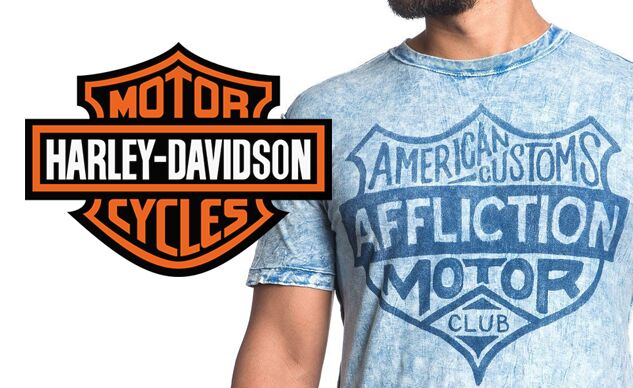
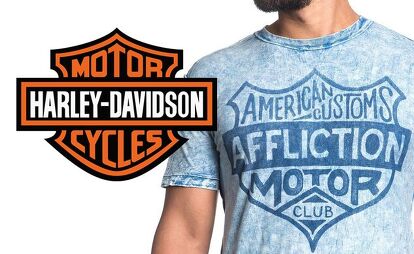


















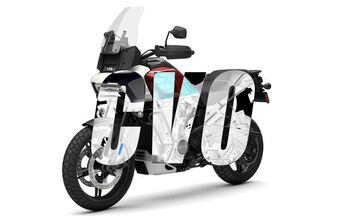


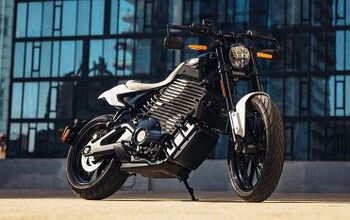

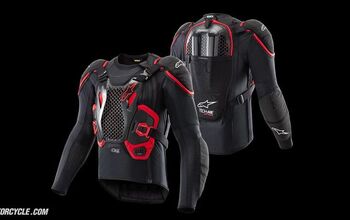



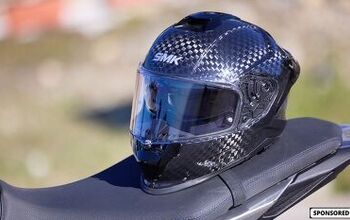
Comments
Join the conversation
Harley isn't selling motorcycles, they've turned into a clothing store. No wonder they' jump at he chance to try and sue someone.
Copyright is stifling american business, HD need to come out with better product